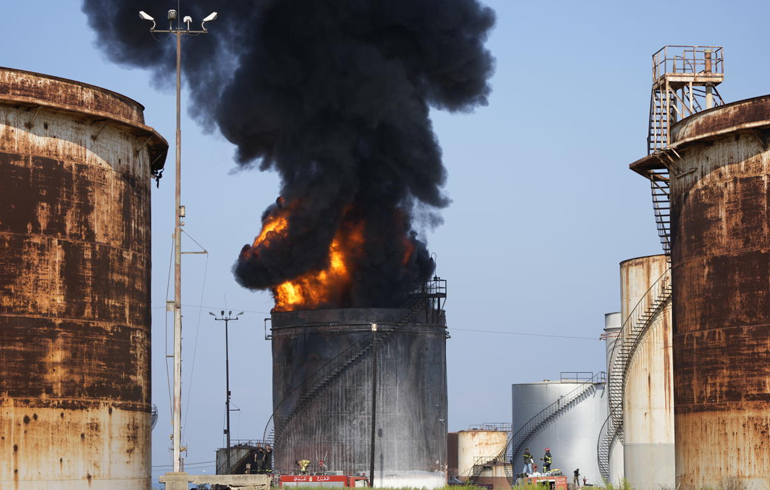A spokesperson for the Lebanese Army told Al Jazeera on Monday that the fuel tank contained benzene.
At least 25 fire trucks are at the oil facility, with firefighters trying to put out the fire while cooling down surrounding tanks to prevent the blaze from spreading.
“We’re now focusing on clearing residents from the area as we try to put out the fire,” the official said. “The priority now is to prevent the fire from reaching other tanks.”
Lebanon’s Energy Minister Walid Fayyad told Al Jazeera that an army fuel tank was on fire.
The tanks at the Zahrani oil facilities store petrol and diesel that the Lebanese government has purchased.
“In addition to that, there is also some fuel for the army and reserve stock,” Energy Researcher Marc Ayoub told Al Jazeera.

One of Lebanon’s key power stations is also located in the vicinity.
The Zahrani power plant went out of commission on Saturday after running out of fuel. The Lebanese army donated some of its reserve stock on Sunday.
In late September, a vessel unloaded 16,000 tonnes of Iraqi fuel at the Zahrani facility, the first shipment in a swap deal between Beirut and Baghdad.
In March, then-outgoing Prime Minister Hasan Diab said experts discovered “dangerous chemicals” at a warehouse in the Zahrani oil installations.
He said German company Combi Lift had reported the matter to Lebanon’s atomic energy authority, which concluded that the material was “nuclear”.
Combi Lift, however, said there were no concrete results yet, and the issue has not been discussed since.
Monday’s blaze comes just over a year after the massive port blast in Beirut that killed more than 200 people, wounded thousands and destroyed nearby neighbourhoods in the capital.
Combi Lift had been hired after the blast to examine the destroyed Beirut Port and discovered 58 containers of hazardous material that had reportedly been stored there for decades.
The fire is another setback for cash-strapped Lebanon as it continues to struggle with a crippling gasoline and fuel crisis that has paralysed public life.
State electricity is virtually non-existent, as most households and businesses rely primarily on private generators.
Fuel prices have been hiked almost weekly, as the government slowly rolls back on expensive subsidies.
Prime Minister Najib Mikati said that resolving the fuel and electricity crisis is one of his government’s key priorities, as he tries to steer Lebanon into recovery from an economic crisis that plunged three-quarters of the population into poverty and devalued the local currency by around 90 per cent.
SOURCE: Al Jazeera




















































